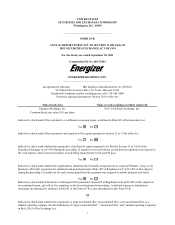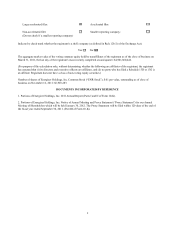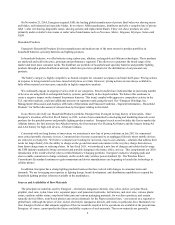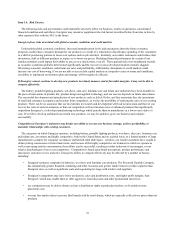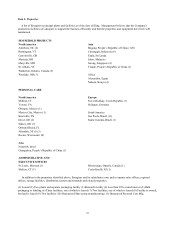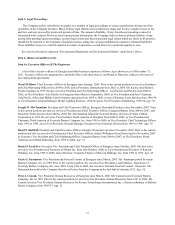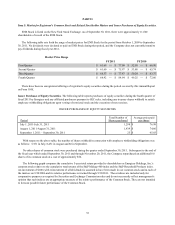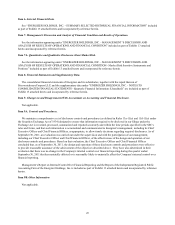Energizer 2011 Annual Report Download - page 21
Download and view the complete annual report
Please find page 21 of the 2011 Energizer annual report below. You can navigate through the pages in the report by either clicking on the pages listed below, or by using the keyword search tool below to find specific information within the annual report.The performance of the primary battery product category may be impacted by further changes in technology and device
trends, which could impair Energizer's operating results and growth prospects.
We believe an increasing number of devices are using built-in rechargeable battery systems, particularly in developed
markets. We believe this continues to create a negative impact on the demand for primary batteries. This trend could put
additional pressure on segment results going forward. Development and commercialization of new battery or device
technologies not available to Energizer could also negatively impact our results and prospects.
Energizer is subject to risks related to its international operations, including currency fluctuations, which could adversely
affect our results of operations.
Energizer's businesses are currently conducted on a worldwide basis, with almost 50% of our sales in fiscal 2011 arising
from foreign countries, and a significant portion of our production capacity located overseas. Consequently, Energizer is
subject to a number of risks associated with doing business in foreign countries, including:
• the effect of foreign income and withholding taxes, U.S. tax treatment of foreign source income and losses, and other
restrictions on the flow of capital between countries;
• our ability to utilize foreign based cash for various strategic needs could result in significant income tax expenses,
which are not currently provided since we intend and plan to permanently reinvest these earnings in our foreign
affiliates to fund local operations, fund pension and post retirement liabilities and to fund capital projects;
• social legislation in certain countries;
• the possibility of expropriation, confiscatory taxation or price controls;
• adverse changes in local investment or exchange control regulations;
• hyperinflationary conditions in certain economies;
• political or economic instability, government nationalization of business or industries, government corruption, and
civil unrest;
• legal and regulatory constraints;
• tariffs and other trade barriers; and
• difficulty in enforcing contractual and intellectual property rights.
Almost 50% of Energizer's sales in fiscal 2011 were denominated in local currencies but reported in U.S. dollars, and a high
percentage of product costs for such sales are denominated in U.S. dollars. Therefore, the strengthening of the U.S. dollar
relative to such currencies can negatively impact our reported sales and operating profits.
Energizer's business is subject to regulation in the U.S. and abroad.
The manufacture, packaging, labeling, storage, distribution, advertising and sale of our products are subject to extensive
regulation in the U.S., including by the Food and Drug Administration, the Consumer Product Safety Commission, the
Environmental Protection Agency, and by the Federal Trade Commission with respect to advertising. Similar regulations have
been adopted by authorities in foreign countries where we sell our products, and by state and local authorities in the U.S. New
or more restrictive regulations or more restrictive interpretations of existing regulations could have an adverse impact on our
business. Legislative and regulatory changes by taxing authorities in both high-tax and low-tax countries have an impact on
our effective tax rate, and we may be subject to additional costs arising from new or changed regulations relating to health care
and energy. Additionally, a finding that we are in violation of, or not in compliance with, applicable laws or regulations could
subject us to material civil remedies, including fines, damages, injunctions or product recalls, or criminal sanctions. Even if a
claim is unsuccessful, is not merited or is not fully pursued, the negative publicity surrounding such assertions could jeopardize
our reputation and brand image and have a material adverse effect on our businesses, as well as require resources to rebuild our
reputation.
We must comply with various environmental laws and regulations in the jurisdictions in which we operate, including those
11


